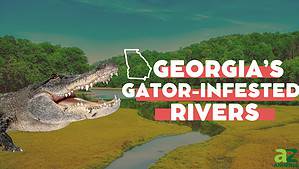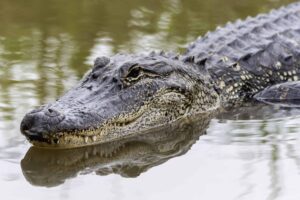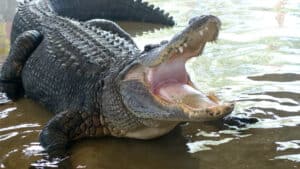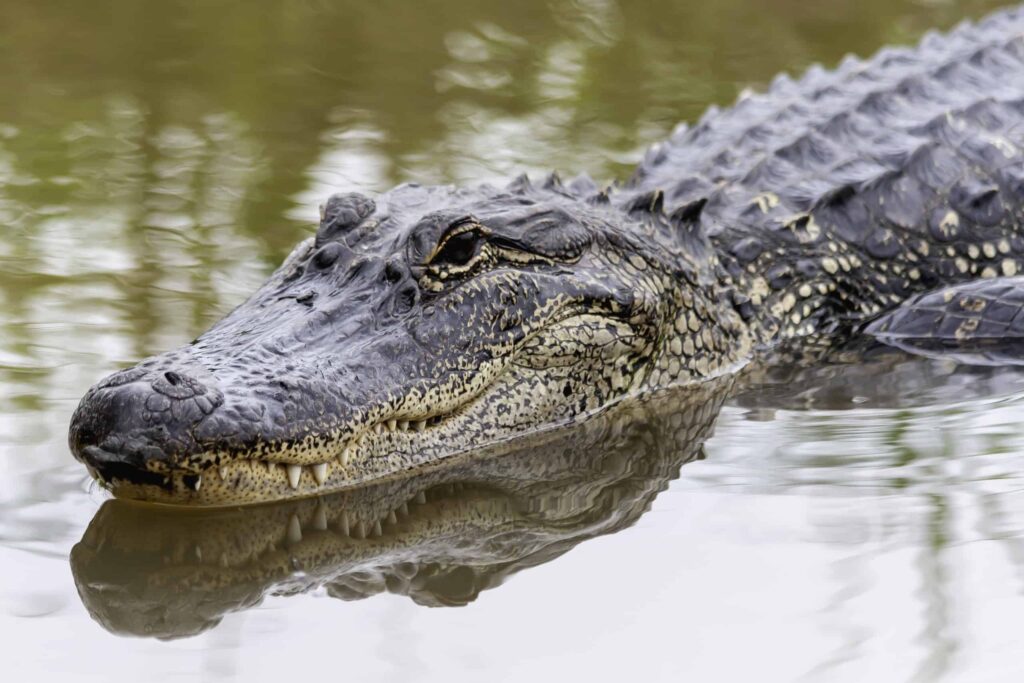
Alligators can be identified from crocodiles due to their broad snouts and visible row of upper teeth only.
©iStock.com/Cindy Larson
Florida is a beautiful state that is known for having delightful oranges, funny news articles, and is home to the majority of the alligator populations in the country.
The Florida Fish and Wildlife Conservation Commission (FWC) is an easy resource for all the state’s national parks, conservation statistics, animal encounters, and reports for locals to know how to live with the wildlife.
Frequent alligator encounters force residents of Lake Talquin to be on guard when living near the shore or taking a hike in the state park. State laws established by the FWC protect the gators and have free resources to protect them and residents from encounters.
This article will provide a clear understanding for those interested in visiting Lake Talquin or those living in the region regarding their reptilian neighbors.
Florida’s Lake Talquin State Park
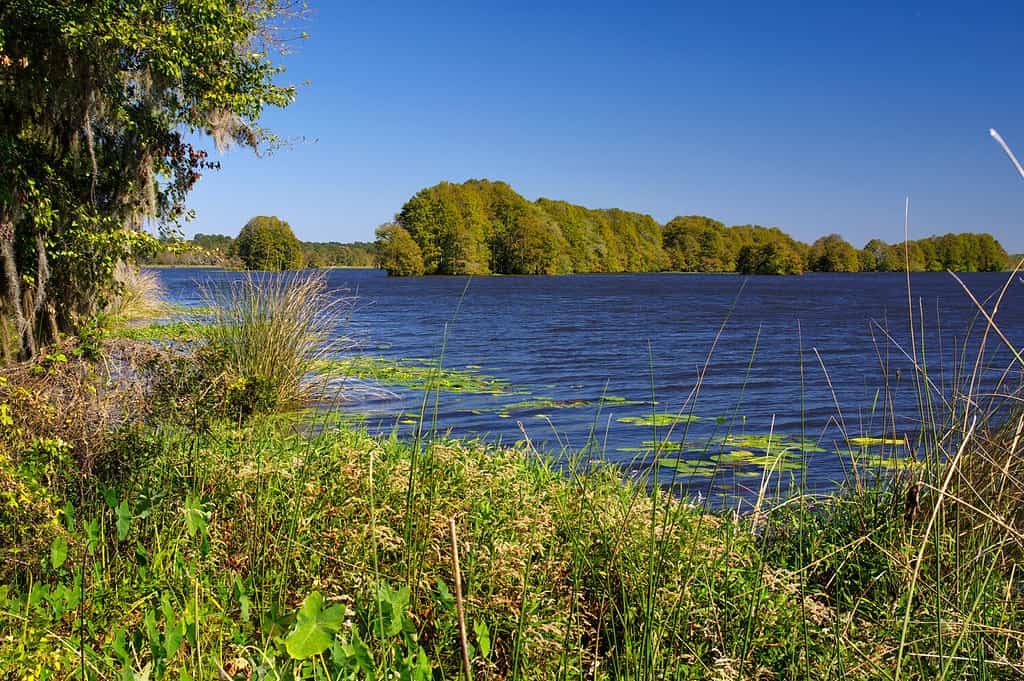
Lake Talquin State Park is based on a man-made reservoir when Ochlockonee River was damed in 1927.
©Rafal Michal Gadomski/Shutterstock.com
In 1927, the Jackson Bluff Company constructed a dam on the Ochlockonee River to generate hydroelectric power for the nearby town. The water back-up and created Lake Talquin.
Lake Talquin’s depth varies depending on the amount of rainfall and location. It ranges from 15 feet deep along the shoreline, to 70 feet deep in certain spots. The shoreline is 40 miles across, providing plenty of walking trails and nature observatories. In total, the lake is 8850-10000 acres long.
The park is open from 8 a.m. until sunset all year. Tallahassee, the capital city of Florida, is 4 miles away, making it an excellent day trip destination.
Park services manage 526 acres of land for public recreation and preservation. Admission is free and guests can spot exotic birds like the Carolina chickadee, Bald eagles, and Ospreys, picnic in designated zones, fish with special licenses and permits, as well as traverse the many hiking trails.
What Alligators Live in Lake Talquin, Florida
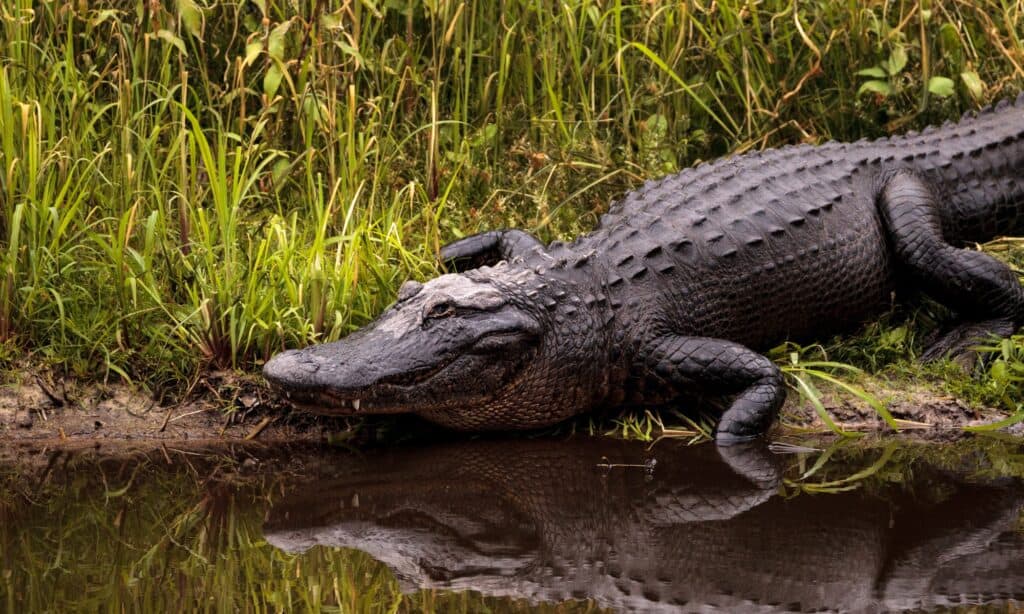
American alligators develop a dark brown to black color as they mature.
©iStock.com/LagunaticPhoto
The American alligator is the only reptile in the Alligatoridae family living in Lake Talquin. Florida does house others like the caiman and American crocodile. However, these reptiles reside in the South where they can be near salt water and other marsh wetlands.
American alligators can reach 8-15 feet long and weigh upward of 400-800 pounds. They can live from 10-12 years in the wild, and possibly longer in captivity.
How Many Alligators Live in Lake Talquin, Florida
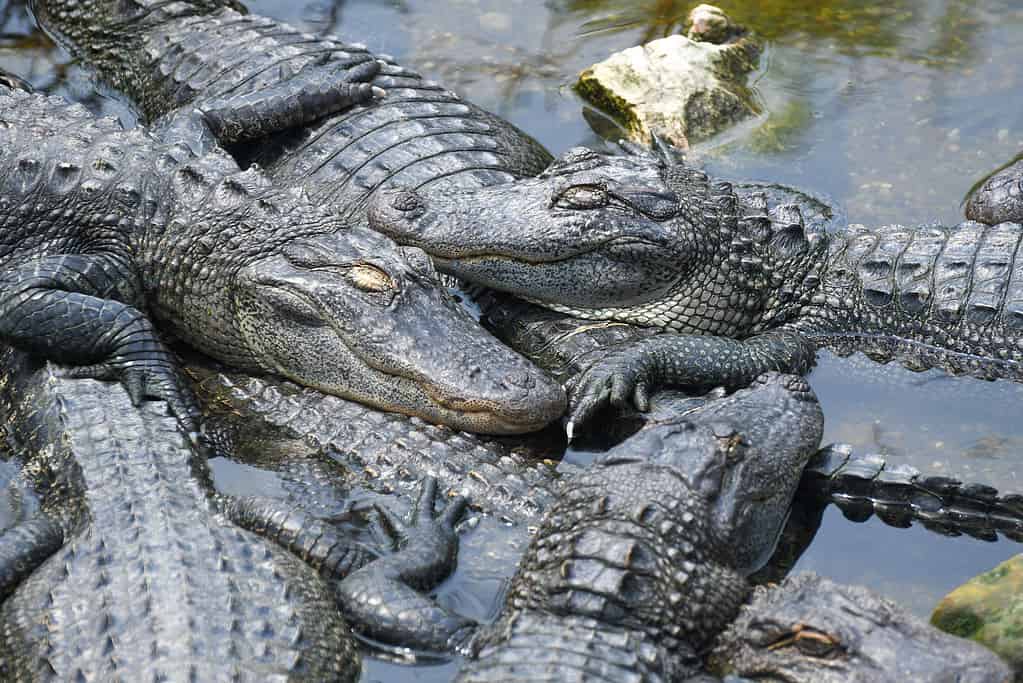
A group of alligators is called a congregation.
©Chris Drahos/iStock via Getty Images
There are approximately 1.25 million American alligators living within the state of Florida. However, the exact number living in Lake Talquin is difficult to pinpoint since the number is constantly changing due to reproduction, alligator nuisance reports, and predation of infant alligators. There are approximately several hundred alligators living across Lake Talquin State Park.
American alligator females lay a clutch of 35 to 50 eggs. The female buries the eggs in vegetation and guards them while they incubate for 65 days. However, many of the young alligators are susceptible to predators and feast upon them while they are small. Among the 35 to 50 that hatch, sometimes half will survive.
What Predators Eat Alligators in Florida
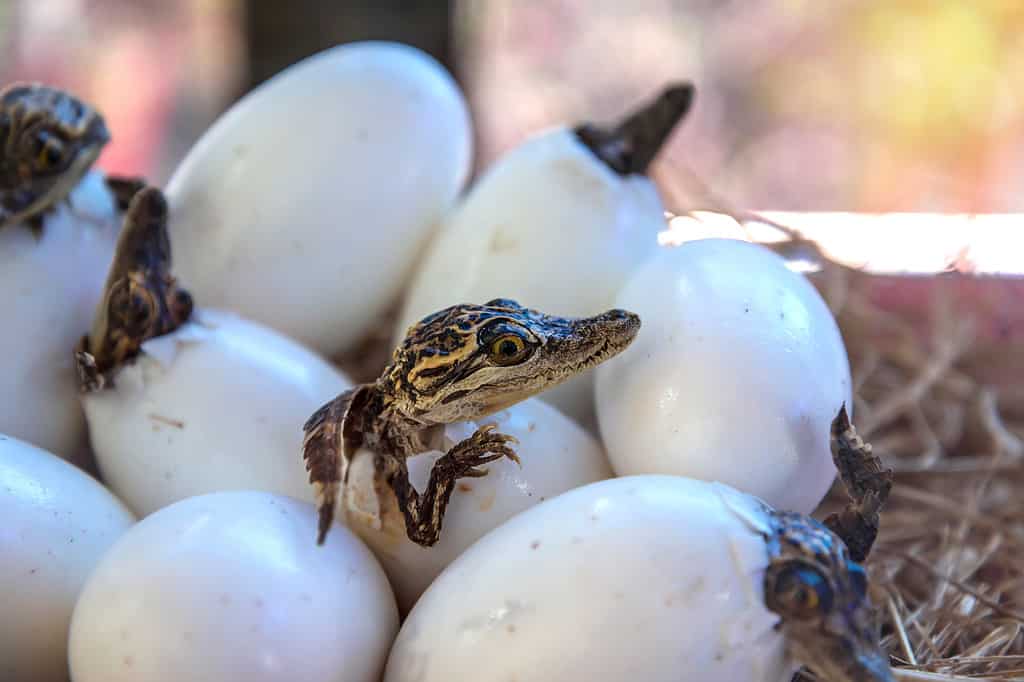
Young alligators hatch from eggs buried in vegetation which hides them from predators.
©Casanowe/iStock via Getty Images
A full-grown American alligator has no fear of any predator. The only creature capable of affecting a full-sized 800-pound alligator is human urbanization and development.
That being said, alligators that are small and weigh less than a house cat are easy pickings for predators. Animals capable of eating an infant American alligator are:
- Herons
- Egrets
- Hawks
- Wild pigs
- Big Fish
- Raccoons
- North American cougar
- Adult alligators
American Alligator Natural Habitat
American Alligators love living in Florida because of the many wetlands within the state. Alligators prefer freshwater like lakes, rivers, and wetlands compared to crocodiles which can enjoy a mixture of fresh and saltwater.
While Florida is the perfect place for American alligators, they inhabit several other states along the North American East Coast.
American alligators can be found in these states:
- Florida
- South Texas
- Louisiana
- North Carolina
- South Carolina
- Georgia
- Alabama
- Oklahoma
- Alabama
- Arkansas
What Do Alligators Eat in Florida
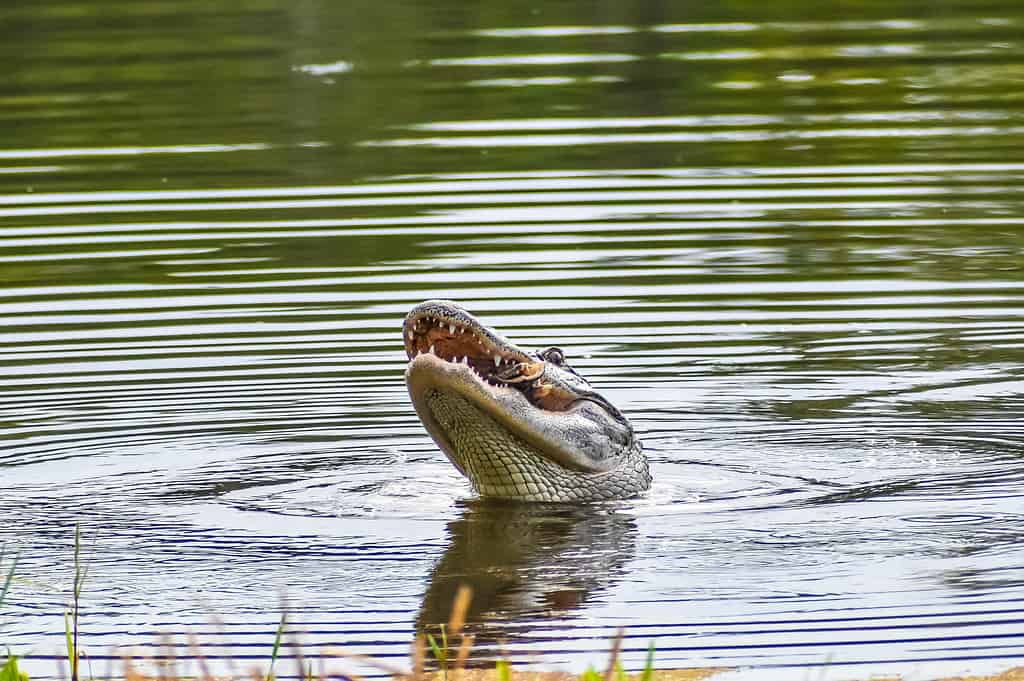
Alligators do not chew their food. They swallow prey whole or tear off pieces of bigg prey to digest easier.
©Jaimie Tuchman/iStock / Getty Images Plus via Getty Images
American alligators are opportunistic feeders. They camouflage themselves in the murky water where their brown and green skin is difficult to identify. When prey comes close to shore to drink, they quickly lunge out of the water and drag the prey into the water to drown them. American alligators have a bite force of 2,000 pounds per square inch. Alligators and crocodiles are known to have the strongest bite force in the animal kingdom. They use that impressive weight to drag the prey underwater and perform a death roll, tearing off pieces to easily gulp down.
Alligators are not picky about what they can eat. If they can snap their jaws onto easy prey and pull it down, they will do so.
Typical American alligator prey consists of:
- Insects
- Amphibians
- Fish
- Snakes
- Turtles
- Birds
- Small Mammals
- Pets
Living with Alligators in Lake Talquin
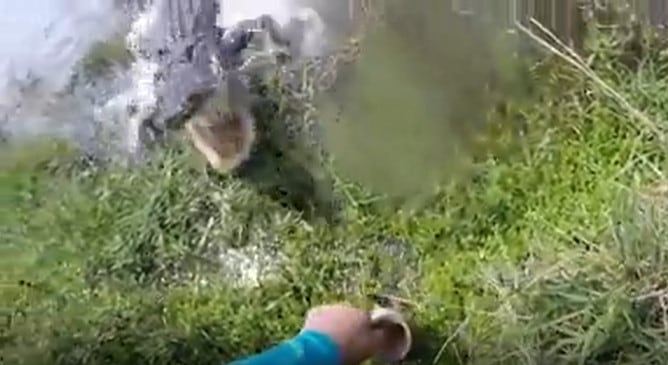
Residents in Lake Talquin and other parts of Florida have adapted to living with alligators daily. Alligators primarily stay within the water, only coming onto land to warm their bodies in the sun, lay eggs, or rest.
The FWC has a toll-free number and a Statewide Nuisance Alligator Program for residents needing to report a nuisance alligator or nuisance alligator sighting. A nuisance alligator is described as being at least 4 feet long and capable of posing a threat to people. Any alligator under 4 feet is not considered a threat to humans and is protected by wildlife conservation laws.
Are Alligator Attacks Common in Florida
According to the FWC official bite incident report, there were 11 alligator bites in 2022 for the whole state of Florida. Two of the bites were reported as minor injuries, not needing medical treatment or attention, and nine bites were reported as major injuries, requiring immediate care.
The last reported fatality from an alligator bite was in 2019 when there were 10 bite incidents in total. The FWC reports bite attacks every year on its website.
What Happens to Nuisance Alligators
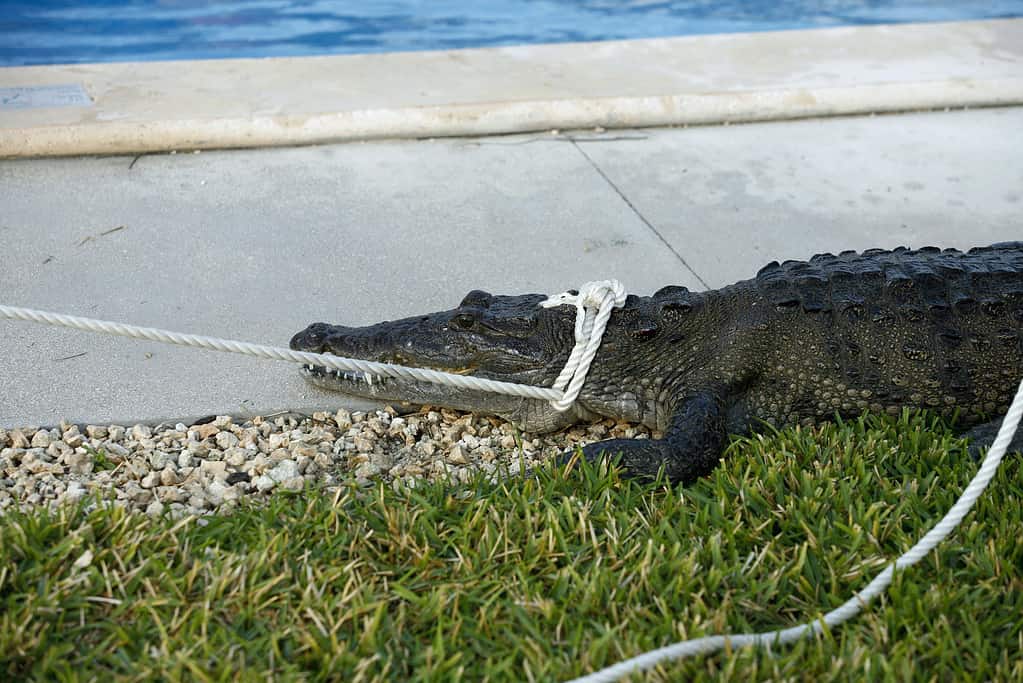
The FWC use professional and residential trappers to capture and relocate nuisance alligators.
©strathroy/iStock via Getty Images
Nuisance alligators need to be apprehended and relocated to protect the safety of the locals, as well as offer the alligator a safer home. Unfortunately, not all alligators are captured alive due to increased accident reports. The FWC certifies residential and professional trappers to handle nuisance alligators.
Residential trapper Lane Stephens apprehended a massive 14-foot alligator in Lake Talquin in 2012. It was the biggest gator on record captured in Lake Talquin at the time.
Before Lane Stephens’ capture, another 14-foot gator was found in Lake Washington near South Florida’s East coast.
The largest alligator ever captured in Florida was at Orange Lake in 1989. The gator was 13 feet long and weighed 1043 pounds.
Avoiding Alligators in Lake Talquin
Living near alligators can be a frightening experience. Homeowners must be constantly vigilant with small children and their pets when walking or exploring the edges of the water.
To avoid alligator encounters, it is imperative to follow these steps.
- Never Feed Wildlife: Feeding alligators will condition them to think any human will provide them with food. This will encourage more alligator incidents because alligators will associate with humans as food providers. They may snap or charge at humans expecting food or grab something close by knowing humans carry food.
- Swim in Designated Areas: Pay attention to signposts and online warnings of alligator sightings. Signs clearly marked with alligators in the vicinity mean that it is not safe to go in or near the water. Only swim in areas where there are no signs of alligators or in closed-off areas where wildlife cannot enter like recreational pools.
- Keep Pets Close: While on a walk or hike, keep pets away from the edges of the water. Large alligators will identify a dog as easy prey and lunge at them for a meal. Alligator attacks happen so fast that there is little to no time to react between the initial attack and pulling them underwater. Keep pets on a short leash and away from waterways. Always carry water when on a hike, with extra for a pet.
- Watch Your Children: Kids are small enough to be considered prey for a large alligator. Always supervise children and be aware of their actions at all times.
- Swim During Daylight Hours: Alligators hunt during sunset and at night. This gives them the best advantage to capture prey. Swimming during the daytime reduces the chances of an attack as they are most likely regulating their bodies by sunbathing.
- Run Away: If an alligator does attack, simply run away. Do not zig-zag or try fancy maneuvers to trick an alligator. Alligators are ambush predators, and many times will give up after the initial surprise attack has failed. However, if an alligator does chase after you, keep running in a straight line to cover as much ground as possible.
What to do During an Alligator Attack in Florida
Alligator attacks will happen regardless of how safe residents can be. Two apex predators living in close proximity will clash eventually.
In the event of an alligator attack, fight back.
- Punch the underside which is softer and more sensitive than the dorsal carapace.
- Poke the eyes to blind the gator.
- Feed the bite by shoving anything into the gator’s mouth to force it to choke and spit you out.
- Attack vital areas on the alligator’s vital areas like the throat and nose.
Fight as hard as possible to force the gator to release you. When free, call the local authorities, report the incident, and seek medical attention immediately.
Visiting Lake Talquin, Florida can be a delightful vacation or day trip to unwind and relax. But it is important to remember that humans are not the only apex predators in the area, and alligators call the lake their home.
Thank you for reading! Have some feedback for us? Contact the AZ Animals editorial team.





